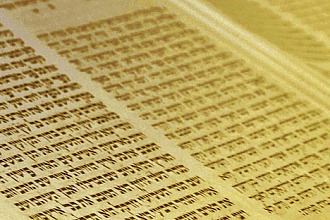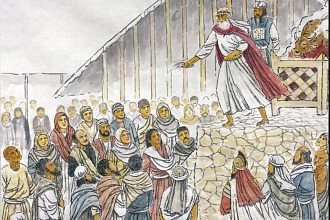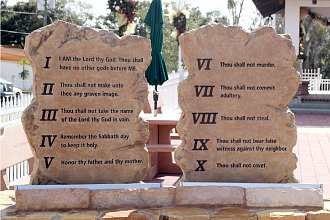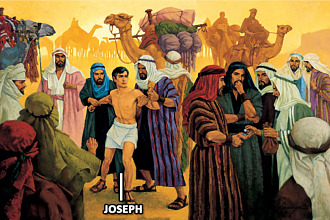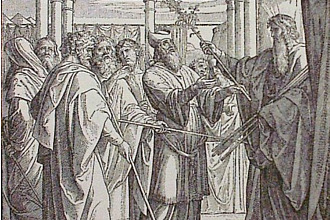Parasha for the Week: Matot/Masei Numbers 30:2 – 36:13
Haftara for the Week: Jeremiah 1:1 – 3:4
Besorat Yeshua: Mark 6:14 – 27
Overview
Moshe teaches the rules and restrictions governing oaths and vows.
Bnei Yisrael wage war against Midian. They kill the five Midianite kings, all the males and Bilaam. Moshe rebukes the officers that women were taken captive. They were catalysts for the immoral behavior of the Jewish People. The spoils of war are apportioned. There was not one casualty among Bnei Yisrael. They bring an offering to the Lord.
The Tribes of Gad and Reuven, who own large quantities of livestock, petition Moshe to allow them to remain east of the Jordan and not enter the Land of Israel. They explain that the land east of the Jordan is quite suitable grazing land for their livestock. Moshe’s initial response is that this request will discourage the rest of Bnei Yisrael, and that it is akin to the sin of the spies. They assure Moshe that they will first help conquer Israel, and only then will they go back to their homes on the eastern side of the Jordan River. Moshe grants their request.
The Torah names all 42 encampments of Bnei Yisrael on their 40-year journey from the Exodus until the crossing of the Jordan River into Eretz Yisrael. G-d commands Bnei Yisrael to drive out the Canaanites from Eretz Yisrael and to demolish every vestige of their idolatry. Bnei Yisrael are warned that if they fail to rid the land completely of the Canaanites, those who remain will be “pins in their eyes and thorns in their sides.” The boundaries of the Land of Israel are defined, and the tribes are commanded to set aside 48 cities for the levi’im, who do not receive a regular portion in the division of the Land. Cities of refuge are to be established for those who unintentionally murder may flee there. The daughters of Tzelafchad marry members of their tribe so that their inheritance will stay in their own tribe. Thus ends the Book of Bamidbar/Numbers, the fourth of the Books of The Torah.
"Nedarim or Laws of Vows"
Parashat Matot begins with the laws of vows (Nedarim); “Moshe spoke to the heads of the tribes of the children of Israel, ‘The L-rd has commanded; When a man makes a vow to the L-rd or swears an oath to bind his soul with a bind, he shall not break his word; he shall do according to all which came out of his mouth.”
“East Bank of the Jordan River”
In Parashat Matot the Torah relates that the tribes of Reuben and Gad had a great multitude of cattle. They came to Moshe and requested to inherit land on the eastern side of the Jordan River, rather than settling on the other side together with the rest of the people of Israel. Moshe rebukes them; “Shall your brethren go to war and you will sit here? You will turn away the hearts of the children of Israel from going into the land which the L-rd has given them.” The tribes of Reuben and Gad replied, “We will build fences to secure our cattle and cities for our little ones. We ourselves will be ready and go armed before the children of Israel. . . . we will not return to our houses until the children of Israel have inherited every man his inheritance.” Moshe was satisfied that they would do their share in fighting for the land. He said to them, “If you will do this thing and go to war… until the land will be conquered before the L-rd… then this land shall be to you for a possession before the L-rd.” Then Moshe instructs them, “Build for you cities for your little ones and folds for your sheep and do that which has proceeded out of your mouth.” The tribes of Reuben and Gad told Moshe, “We will build fences to secure our cattle and cities for our little ones.” First they mentioned securing their cattle and then their children. Our sages tell us that Moshe rebuked the two tribes for speaking of the safety of their cattle before their children. Thus, he instructed them to go about this in the proper order; “Build cities for your little ones and stables for your sheep.” There is an important lesson here, especially in our time when so much emphasis is placed on material success, even at the expense of our children. We must place much greater priority on protecting our children. Monetary and social success may be important, but they should be secondary to the spiritual, moral, and emotional well being of our children.
By placing themselves on the eastern side of the Jordan and separating themselves from the rest of the people of God they set themselves up to be the first ones attacked when the Assyrians and Babylonians came to conquer the land. If we keep ourselves on the fringe of the congregation of God we leave ourselves vulnerable to the attacks of the enemy.
“Physical and Spiritual Journey”
This week’s second Parasha, Masei, concludes the fourth Book of the Torah - Bamidbar (Numbers). Parasha and the name of the Parasha contains lessons for us. The name of the Parsha, Masei, means “Journey.” This Parasha records all 42 places where the Jewish people camped during their forty year “journey” in the Sinai desert. The main emphasis of the Parsha is upon the places they “rested” and what events occurred in some of these places. Yet, the Parasha is called “Masei” which signifies the fact that “they traveled” rather than “they camped.” A believer should never be satisfied with the accomplishments of today, but always strive for higher. This concept is represented in the name of the Parasha, Masei. For instead of focusing on our achievements and resting places, we must continuously strive to go forward. Even the “stops” and “resting places” in life are for the purpose to gain strength to continue journeying forward and to go from strength to strength in our spiritual journey through life.
“Live in Peace”
In the 1940’s a young student who had escaped from Nazi Europe was walking through the streets of Shanghai. He was stopped in his tracks by hysterical ranting coming from a radio in an upstairs apartment. The voice was shrieking in German, “Come, let us obliterate from the world that nation that will not let us live in peace!” A sea of voices swelled behind him chanting, “Seig Heil! Seig Heil!” The young man was shaken to the depths of his soul. He ran immediately Rabbi Levenstein and repeated what he had heard. “For once,” responded the rabbi, “he’s telling the truth.” “The Jewish People will not let the world live in peace. The Jewish People proclaim to the world, by our very existence, that many things the world holds extremely dear are, in fact, worthless. When Haman looks at Mordechai he sees someone to whom all his power and money and status is a joke — Mordechai negates his entire existence. For this, the Jewish People have been hated down throughout the generations.”
HAFTARA Jeremiah 1:1 – 3:4
Haftara: The haftarah is about the calling of Jeremiah, a cohen from Benjamin (Jer 1:1) who had no function in the temple and suddenly is called to be a prophet “I appointed you a prophet to the nations.”(Jer 1:5). He refuses first “Ah, Lord GOD! Truly I do not know how to speak, for I am only a boy.” (Jer. 1:6), but when G-d is calling who can really refuse? Jeremiah received visions from G-d.
1. “I see a branch of an almond tree.” The L-rd explains: ““You have seen well, for I am watching over my word to perform it.” (Jer 1:11-12).
2. “I see a boiling pot, tilted away from the north.” (Jer 1:13). G-d explains again, “Out of the north disaster shall break out on all the inhabitants of the land.” (Jer 1:14) The message is clear, great disasters will happen if nothing changes. What the L-rd is waiting for is the coming back of His people: repentance, that’s why He calls them to come to the gates of Jerusalem (place of judgment) “For now I am calling all the tribes of the kingdoms of the north, says the LORD; and they shall come and all of them shall set their thrones at the entrance of the gates of Jerusalem, against all its surrounding walls and against all the cities of Judah.” (Jer 1:15). People like to hear good news, not bad news. That is why G-d says to Jeremiah that his message will not be popular, he will have difficult times and will not be listened to. “They will fight against you; but they shall not prevail against you, for I am with you, says the LORD, to deliver you” (Jer 1:19). In the chapter 2, God announces the destruction of the holy city of Jerusalem “disaster came upon them, says the LORD.” (Jer 2:3) It is not the city, the stones who are important but the people who are living there: I remember the devotion of your youth, your love as a bride, how you followed me in the wilderness... Israel was holy to the L-rd” (Jer 2:2- 3).
Besorat Yeshua Mark 6:14 – 27
Haftara: The destruction of Jerusalem is coming soon, why? because the people of G-d are not listening to G-d and His prophet. Jeremiah will be in jail and persecuted.
Besorah: The time of Yeshua was not different, our text of the besorah describes the death of one of the greatest prophets after Moshe. This prophet is Yochanan Ha Matbil (John the Immerser). Yeshua, speaking about Yochanan said one day to his talmidim “What then did you go out to see? A prophet? Yes, I tell you, and more than a prophet. (Matt 11:9). He was more than a prophet. Yeshua said, “Elijah has already come, and they did not recognize him, but they did to him whatever they pleased. So also the Son of Man is about to suffer at their hands.” The disciples understood that he was speaking to them about John the Immerser.” (Matt. 17:12- 13) Elijah (Eliyahu HaNavi) would come before the coming of the Messiah and Yeshua revealed that the Elijah came, he was this John the Immerser who prepared the way for Him.


